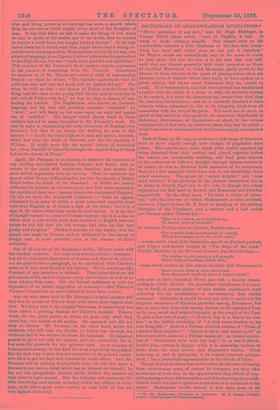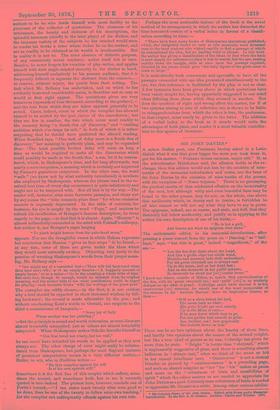DICTIONARY OF SHAKESPEAREAN QUOTATIONS.*
" Mucrx quotation of any sort," says Sir Hugo Mallinger, in George Eliot's latest novel, "even in English, is bad. It tends to choke ordinary remark. One cannot carry on life comfortably without a little blindness to the fact that every- thing has been said better than we can put it ourselves." Sir Hugo's words are undoubtedly true in the sense in which he uses them, but not the less is it the fact that men will, until they are blessed generally with such memories as those of Cardinal Mezzofanti or Lord Macaulay, gladly profit by the labours of those who are at the pains of placing before them the ipsissima verba of authors whom they know to have spoken on a given subject, but whose exact utterances they are unable to recall. Be it remembered, too, that when perusal has familiarised a reader with the action of a poem or play, his curiosity ceasing to be excited, it is what the characters say, rather than what they do, that fixes his attention ; and he is naturally thankful to have what he wishes submitted to him in its integrity, freed from all connection with the text of the piece. Nor need one do more, in proof of this assertion, than point to the numerous Handbooks of Reference, Dictionaries of Quotations—in short, Lo the various compilations of that sort, by whatever name they may be called— which from time to time issue from the Press to supply a recognised want.
Such of these, by the way, as embrace a wide range of literature seem to show clearly enough how charges of plagiarism have arisen. The coincidences, made much more readily apparent by being detached from their context and placed together before the reader, are occasionally startling, and lend great interest to the endeavour to follow a thought through various writers to its source, or even to discover fresh instances of its occurrence. Here are a few examples which have not, to our knowledge, been noted elsewhere. The germs of "carpet knights" and "nine days' wonder," if not allusions to the phrases themselves, are to be found in Twelfth Night and As You Like It, though the actual expressions are first used by Burton, and Beaumont and Fletcher respectively. On the other hand, "To make a virtue of neces- sity," with the first use of which Shakespeare is often credited, occurs in Utopia (where Sir T. More is speaking of the military discipline of the Utopians), and a century and a half earlier yet Chaucer makes Theseus say :— " Than is it wisdom, as it thinketh me,
To roaken vertu of necessite."
In Greene's Looking-glass for London, Remilia says :— "For women's locks are trammels of conceit, Which do entangle Love, for all his wiles,"
—words which recall both Bassanio's speech on Portia's portrait, and Pope's well-known couplet in "The Rape of the Lock."
Finally, Marlowe, in his Hero and Leander, has the following:—
" 'Tis wisdom to give much, a gift prevails Where deep-persuading oratory fails," —lines which contain an idea almost identical with Shakespeare's
"Dumb jewels often in their silent kind More than quick words do move a woman's mind."
and seem to have furnished Byron also with a famous stanza- ending in Childe Harold. On proverbial coincidences it is need- less to dwell, as among masses of men similar experiences must (allowing for the modification of circumstance) find similar utterance. Otherwise it would be easy not only to point out the frequent recurrence of the same proverbs among Europeans, but also to show that they exist among nations so far separated from us by race, creed, and habit of thought, as the people of the East. To give a few out of many :—" Even a dog is a lion in his own lane" is the Indian rendering of "A cock crows loudest on his own dung-hill ;" there is a Persian metrical version of "Birds of a feather flock together ;" "Speech is silver and silence gold" (a Dutch proverb) exists as a Persian hemistich ; an Arabic equiva- lent of "Faint heart ne'er won fair lady" is, or was in Barck- hardt's time, current in Egypt ; while it is somewhat curious to learn, from the same source, that Rousseau's maxim, "Dites beaucoup de mal de quelqu'un, il en restera toujours quelque chose," has a proverbial representative in the streets of Cairo.
Though in such books as that under notice the pleasure of tracing these coincidences must, of course, be foregone, yet they offer an interest of their own in the opportunities they afford of com- paring passages from different plays, and thus observing the modifi- cations which the poet's opinions underwent as he advanced in his career. Shakespeare would, indeed, at first sight, seem of all
* Tue New ShakePeriaw Diegiewsni re Quotations. By G. Somers Bellamy. London : Charing-Oros. Publishing Company.
authors to be he who lends himself with most facility to the purposes of the collector of quotations. The clearness of his utterances, the beauty and richness of his descriptions, the splendid terseness (chiefly in the later plays) of his diction, and the immense variety of the subjects he has touched would seem to render his works a mine whose riches lie on the surface, and are as readily to be obtained as its wealth is inexhaustible. But in reality it is not so. The utter absence of didactic purpose, of any consciously moral tendency, makes itself felt at once. Besides, he never forgets his vocation of play-writer, and applies himself with such single-minded sincerity to the natter in hand,
addressing himself exclusively to his present audience, that it is frequently difficult to separate the abstract from the concrete,—
to remove, without injury, the pearls from their setting. The task which Mr. Bellamy has undertaken, and on which he has evidently bestowed considerable pains, is therefore not so easy as would at first sight appear. The quotations given are very numerous (upwards of four thousand, according to the preface),— and the text from which they are taken appears generally to be
sound. Cases, indeed, occur in which the compiler has allowed himself to be misled by the ignis fatuns of the emendators ; but
they are few in number, the two which occur most readily to
the memory being "a South-Sea of discovery," and "vaulting ambition which o'er-leaps its selle," in both of which it is rather
surprising that he should have preferred the altered reading.
When Rosalind says, "One inch of delay more is a South-Sea of discovery," her meaning is perfectly plain, and may be expanded thus : 'The least possible further delay will seem as long a time as would be required to make all the discoveries which could possibly be made in the South-Sea,' a sea, let it be remem- bered, which, in Shakespeare's time, and for long afterwards, was
nearly a mare incognitum, a meaning which is certainly not improved by Farmer's gratuitous conjecture. In the other case, the word 66 selle " (we know not by what authority introduced) is nowhere
else employed by Shakespeare, whereas the phrase used in the re- ceived text (one of every-day occurrence) is quite satisfactory and ought not to be tampered with. But all this is by the way.—The reader will, however, miss some favourite passages, and those not by any means the "trite common-place lines" for whose omission censure is expressly deprecated. In the table of contents, for instance, his eye is caught by the word "Fops," and anxious to refresh his recollection of Hotspur's famous description, he turns eagerly to the page,—to find that it is absent. Again, "Honour" is almost indissolubly connected in the mind with Falstaff's soliloquy, but neither it, nor Hotspur's eager longing
"To pluck bright honour from the pale-faced moon," appears. Nor are the thoughtful verses in Which Helena expresses her conviction that Heaven "gives us free scope" to be found,—
at any rate, none of them are given under the ideas which they would most naturally awaken. Objecting very justly to the practice of wresting Shakespeare's words from their proper mean- ing, Mr. Bellamy says :—
" One might say of a conceited fool—' Thou wilt fall backward when then hast more wit ;' or of an empty theatre—' A beggarly account of empty boxes ;' or to a tailor—' Go to the creating a whole tribe of fops.' But each line, though fit enough, would be strained from its original meaning, and the anther fails to see what justification could be urged for playing such fantastic tricks' with the writings of the great poet."
The examples are oddly chosen,—in the first, it is not evident why a fool should be expected to show increased wisdom by fall- ing backward ; the second is made admissible by the pun ; and without overlooking Kent's words to Oswald, one suspects in the third a reminiscence of Imogen's,—
" Some jay of Italy
Whose mother was her painting ;"
—but the principle is sound and worth reiteration, as some lines are almost invariably misapplied, just as others are almost invariably misquoted. When Shakespeare makes Othello describe himself as "One that loved not wisely, but too well," he can never have intended his words to be applied as they now always are. The other charge of error might easily be substan- tiated from Shakespeare, but perhaps the most flagrant instance of persistent misquotation occurs in a very different author,— Butler, to wit, who in lludibras writes :— " He that complies against his will 'Is of his own opinion still."
Sometimes it is the first line of this couplet which suffers, some- times the second, and sometimes both, but to see it correctly quoted is rare indeed. The protest here, however, reminds one of Portia's remark,—" I can easier teach twenty what were good to be done, than be one of the twenty to follow mine own teaching," for the compiler not unfrequently offends against his own rule. Perhaps the most noticeable feature of the book is the novel method of its arrangement, in which the author has discarded the time-honoured custom of a verbal index in favour of a classifi- cation according to ideas :—
" There have been many books of Shaksperian Quotations published,. which, tho' delightful books to read at idle moments, were tiresome ones to the busy student who wished rapidly to find a passage of which he remembered the idea, but no leading word or phrase. In this work the author has given a classification of the ideas, so that when the book is used simply for reference no time is lost in search, but the eye, paesimg rapidly down the margin, falls at Once upon the passage required, directed by the words which give the baby figure of the giant mass to come at large.'"
It is undoubtedly both convenient and agreeable to have all the passages connected with one idea presented simultaneously to the eye, but that reference is facilitated by the plan is not so dear.
A few instances have been given above in which quotations have- been vainly sought for, having apparently suggested to one mind
ideas differing from those which they aroused in another. Nor does the question of right and wrong affect the matter, for if of two systems aiming at ease of reference one is shown to be liable to misapprehensions from which the other is free, the preference, in that respect, must surely be given to the latter. The addition
of a verbal index to the book as it stands would unite the advantages of both plans, and render it a most valuable contribu- tion to this species of literature.



































 Previous page
Previous page